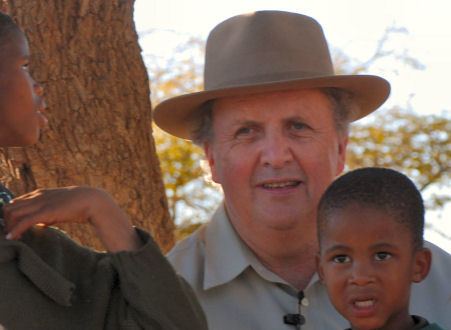Alexander McCall Smith returns to his roots
08/04/2008

Photographs and interview by Mats Ogren
Outside the Botswana capital of Gaborone a little girl is running excitedly though the hot dust. "He has arrived, he has arrived!". The welcome is warm and the visitor is familiar. Thus starts another visit for Alexander McCall Smith to SOS Children's Tlokweng Village.
"During my travels in Botswana, I got to know Derek James and Betty Mpodi, the former head of this Village. Betty is the inspiration for Mma Potokwane, the matron of the orphan farm in the books. As my readers know, she is a very determined lady who does everything she can to help the children". says the author who has his own unique method of travelling, talking to people, listening to stories and taking pictures. "I go to Botswana to seek inspiration for my books. There is a certain pace of life here, a slowness, that is very
special"
Every year, he returns to Botswana and never misses the chance to meet with the staff and the children at Tlokweng. "What impresses me most is that every child gets unconditional love. It is the most extaordinary feeling everytime I come here".
Alexander McCall Smith enjoys a "concert" the children arranged for him. He plays for fun himself in 'The Really Terrible Orchestra'. After the concert, Derek James, the current village director proudly speaks of the achievements made by the village since Alexander McCall Smith visited last time: "We now have six students attending University and another six who received a scholarship to attend the private school Marapula."
"Well done" replies Alexander McCall Smith. He understands too well the challenges that face children here in Botswana, one of the world's hardest hit countries by the HIV/Aids-epidemic. Almost 40% of the pregnant mothers are HIV-positive and 17 % of the entire population has the virus.
"We feel a large amount of pressure. If nothing is done, there will be a lot of children suffering stigma, exploitation and disease. They are the future generation of this developing country. We have just built a third Children's village in Serowe, where there are many Aids cases" says Derek James.
McCall Smith understands very well: "In most sub-Saharan countries, relatives are the social security net. But the traditional system of the extended families has broken down because of the HIV/Aids epidemic. The people here simply can't handle the amount of orphans any longer"
The day before Alexander McCall Smith's arrival, another AIDS death occurred, but at the SOS Village in Francistown, further north of Gaborone:
"A girl died of kidney failure due to Aids. She was only nine years old. When she came she had been gang-raped by seven adult men and that is how she had got the disease. After 15 years here, I try to be rational about it, thinking that she was incurably ill, but it is a terrible grief for all of us." says Derek James.
Aids in Africa: a difficult topic
In the book series, the issue of HIV/Aids is highlighted but Alexander McCall Smith never specifies the name of the disease. "I have been thinking very carefully about how I shall portray this dreadful disease that haunts southern Africa and creates tragedies on every level. Aids has an enormous impact on Botswana and the other countries in the region. But if I was to put the epidemic centre-stage, the books would change from being celebrations to being tragedies. Almost every book that is written about Botswana is a tragedy and I want to show the other side, all the good that still is here" Alexander McCall
Smith explains.
The older children are starting to play football, and the younger ones all want to sit on Alexander McCall Smiths lap. The author, who is married and has two daughters himself, loves children and has written several children's books, in the Akimbo-series. "To me, it is very encouraging to see the good work that is being done to help all these children. I admire them greatly"
Relevant Countries: Botswana.